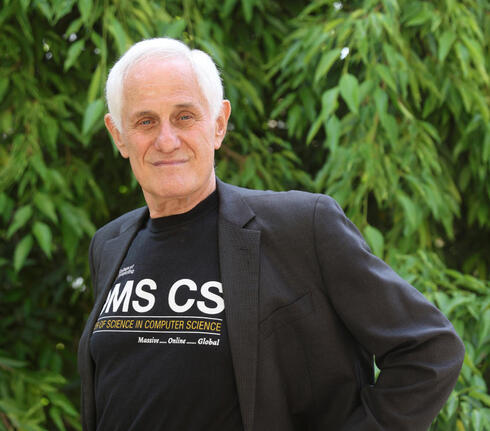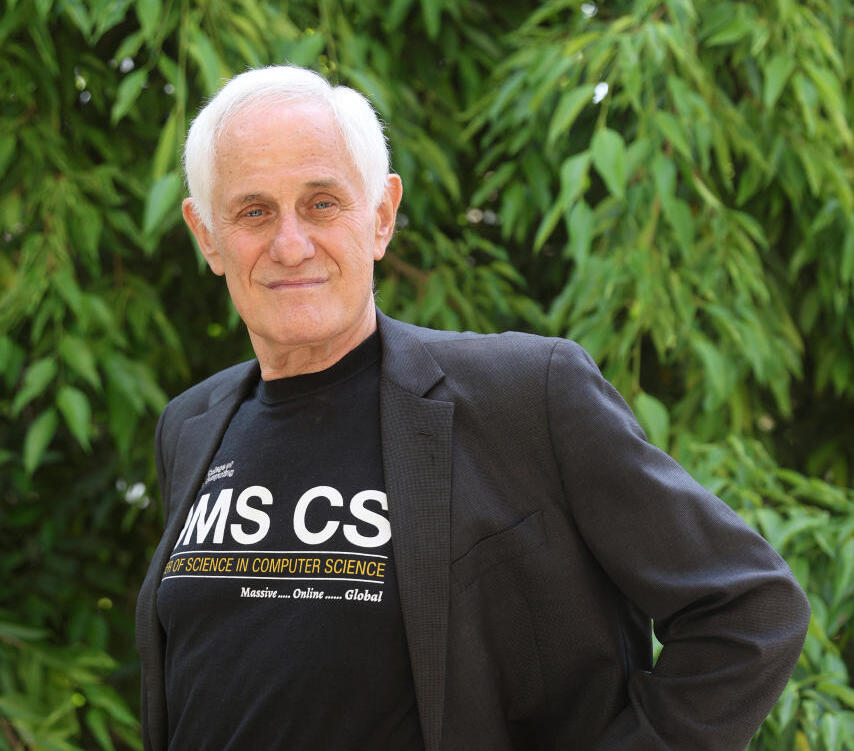
"Only the Catholic Church is more conservative than universities"
Dr. Zvi Galil founded Georgia Tech's computing online program which has opened up new opportunities for students, challenged the status quo, and sparked a broader conversation about the future of online education
In recent years, the landscape of higher education has undergone a profound transformation, with online learning emerging as a viable and increasingly popular option for students worldwide. One institution that has embraced this shift is Georgia Tech, a renowned technological university that has successfully launched an online master's degree program in computer science. Founded by Dr. Zvi Galil, the program has garnered widespread attention and acclaim for its innovative approach, high-quality curriculum, and affordability. By leveraging technology and reimagining traditional educational models, Georgia Tech's online program has opened up new opportunities for students, challenged the status quo, and sparked a broader conversation about the future of online education.
After you were removed from the position of president of Tel Aviv University in 2009 due to a conflict with the executive council, you said to Calcalist that you were sorry you came. Do you still feel the same way today?
"Yes, but ultimately, no, because it turned out to be a blessing in disguise. When asked if I would have come knowing what would happen, I said no. I picked myself up and established an online master's program in computer science at Georgia Tech, which has been the most significant achievement of my life."
You are a distinguished scientist. You have developed algorithms that have revolutionized text search and graph construction on computers. Why is this accomplishment more important to you?
"That's correct, I take pride in my scientific contributions. I am a member of the American National Academy of Engineering and the American Academy of Arts and Sciences. However, through my online degree, I have made a profound impact on the lives of thousands of individuals. This is an entirely different level of significance. I receive heartfelt letters of gratitude from graduates in places like Singapore and Ecuador, expressing how much their lives have changed. Over the past ten years, we have had 9,600 graduates, and currently, we have 12,000 students."
What makes your degree program special?
"The main factor is affordability. That's what made it groundbreaking. In 2013, Prof. Sebastian Thrun, co-founder of Udacity, suggested opening the first online degree on the MOOC platform (Mass Open Online Courses) for $1,000. I proposed a more balanced approach and settled on $4,000. Eventually, we set the price at $7,000 for safety margins. At that time, we were not concerned about profitability; we were simply naive and inexperienced."
Isn't that still a relatively low cost?
"At Georgia Tech, a computer science degree (their faculty ranks 26th globally according to the Shanghai ranking of computer science faculties, surpassing any Israeli institution) costs $40,000 for non-residents and $25,000 for residents. At Columbia, where I served as the dean of the engineering faculty, it costs $70,000. Currently, there are 70 master's programs in 30 universities based on MOOC technology that follow our model. However, we remain the most affordable option, significantly below $10,000. While others charge around $20,000, we have reduced our fee to $6,100. Furthermore, we have introduced two additional programs: data science and cybersecurity."
How do you select your students?
"We require a TOEFL test for English proficiency but have waived the computer science test since we aim to attract not only computer science students. Stanford and Harvard accept only 4% of applicants and utilize various arbitrary criteria, such as the candidate's family donations, as there is limited capacity. On the other hand, we accept everyone who meets the requirements."
So, what criteria are used to exclude unsuitable candidates?
"Admission is conditional, and students must earn an A or B grade in two courses during the first year. The completion rate for those who started on a conditional basis is 68%, while for those accepted outright, it is 85%. Some dropouts only enroll in 2-3 courses anyway. A study conducted at Harvard revealed that most of our students would not have pursued a master's degree without the online option. More than 50 of our graduates have now gone on to pursue doctoral degrees. We foresaw that this would create opportunities for the masses, but we never anticipated its magnitude."
How do your online students differ from those on campus?
"The average age of on-campus students is 22, as they continue immediately after completing their undergraduate studies. In contrast, the average age of online students is 30. It's a different demographic. Online degrees are particularly popular for practical fields such as computer science and business administration, which are in high demand. If the number of students is small, online education isn't necessary. In fields like medicine or sciences that require laboratory work, online teaching becomes more challenging."
Are most of your online learners international students?
"On the contrary, only a third of our online students are international. On-campus, two-thirds are international students who seek visa opportunities."
What are the program requirements?
"The entire program consists of 10 courses without a thesis. We offer three semesters per year, and on average, students take 1.3 courses per semester. Our courses are highly practical, involving significant projects. I made sure that the online program matches the quality of the on-campus experience, so not all students complete the program."
What motivates faculty to engage in online teaching? Once the courses are recorded, they no longer need to be involved.
"I formed a committee of faculty members who deliberated for six months before deciding how to proceed. I made it clear that they should be compensated for their efforts, not work for free. Lecturers receive $30,000 for recording each course. Additionally, during the semester when they teach the course, they receive an extra $10,000. Even if they do nothing, they still receive $2,500 for the rights. So, it benefits the lecturers as well. We started with five courses, and now we have 60."
Why is there an issue with recording Zoom lessons?
"Online courses require pedagogy and course designers. Initially, the production cost for each course was around $300,000, but we have learned to improve efficiency and bring it down to $150,000. The lessons are divided into sections, each followed by questions to test comprehension."
How does the lower price benefit Georgia Tech?
"The university's reputation has soared. We have received extensive media coverage, with over 1,300 articles published about the program, including dozens in The New York Times and The Wall Street Journal, some even making the front page. Most importantly, the program generates approximately $100 million in revenue for the university each year."
How is that possible? The annual tuition fees only amount to a quarter of that figure.
"The state of Georgia allocates funds to its universities based on a formula tied to the number of students. Thus, the program has increased Georgia Tech's budget by $100 million."
How do you address the issue of test supervision and plagiarism?
"There will always be instances of plagiarism, but it's crucial for every university to combat it to safeguard its reputation. That's why we have a supervising company and invigilators who monitor the screens of every 50 exam takers. Those found to have engaged in academic misconduct face disciplinary proceedings."
After the COVID-19 pandemic, there was speculation about a revolution in online education, but in reality, many professors returned to traditional classrooms. Why do you think that happened?
"During the pandemic, many courses were hastily recorded in a short and inexpensive manner, resulting in lower quality. However, it did bring online education to the forefront, and I hope it will lead to an expansion of online programs."
Why haven't prestigious universities like Harvard and Stanford joined this movement?
"Perhaps, in the end, they will be left behind. Universities are among the most conservative institutions, second only to the Catholic Church. Faculty members are resistant to change."
Doesn't the current crisis in the high-tech industry reduce the need for training a large number of computer experts?
"There is still a significant shortage of computer professionals worldwide. Even those who are laid off can find new employment opportunities. While some companies may be downsizing, others are growing exponentially."
What about online bachelor's degrees?
"I believe that about a third of bachelor's degree programs should be offered online. This allows students to work while pursuing their degrees, either by starting with online courses or completing their degrees while employed. It also allows for internships while studying. For students, it reduces costs by about 25%. This approach benefits universities because they can still maintain full capacity on campus. We may see weaker institutions facing challenges, but the impact on top-tier universities will be minimal."
How will this impact Israel?
"In Israel, it may disrupt private institutions since our degree is more affordable. Moreover, online education can attract many ultra-Orthodox individuals to join the workforce."
Is the number of your online students still growing?
"We experienced growth during the pandemic, but the numbers stabilized afterward. We don't invest in advertising or marketing; most of our growth comes from word of mouth, in addition to the numerous lectures I have given worldwide."
Do you have any limitations in terms of enrollment?
"We currently have 450 teaching assistants, with 350 of them being students or graduates who receive modest compensation. They contribute out of a desire to give back. It's something I never expected or dreamed of. However, if we reach 20,000 students, we might face a shortage of teaching assistants. In some of our artificial intelligence courses, we have an artificial teaching assistant named Jill Watson, who supports teaching across 20 courses."
Do you have any future projects in mind?
"I consider myself fortunate. My first stroke of luck is my wife, Prof. Bella Galil, a marine biologist who has discovered numerous species named after her, including the wandering string jellyfish. We have a multi-continental marriage. I climb 100 floors each day and walk 8-10 kilometers daily. I'm in pretty good shape. However, when it's over, it's over. That's why we are making the most of our travels now."
The recent "US News" university rankings did not include a single Israeli university among the top hundred. Why do you think that is?
"Many excellent Israeli academics are not in Israel. There are still outstanding individuals here, but a significant portion is abroad. Foreign institutions offer higher salaries and better career prospects. Competition is fierce, while salaries in Israel are notoriously low. I support offering higher pay and incentives to exceptional individuals. All universities in the United States have a differential pay system."















